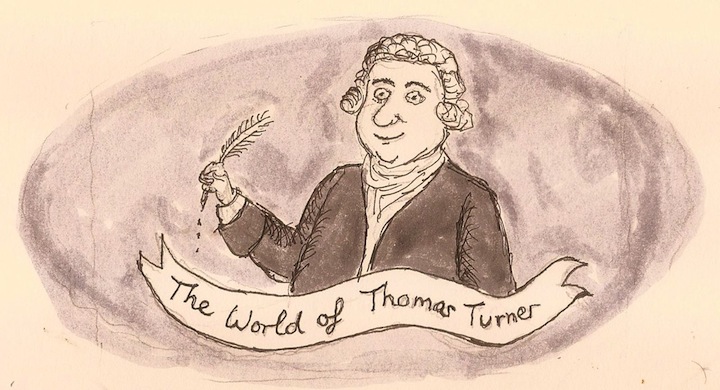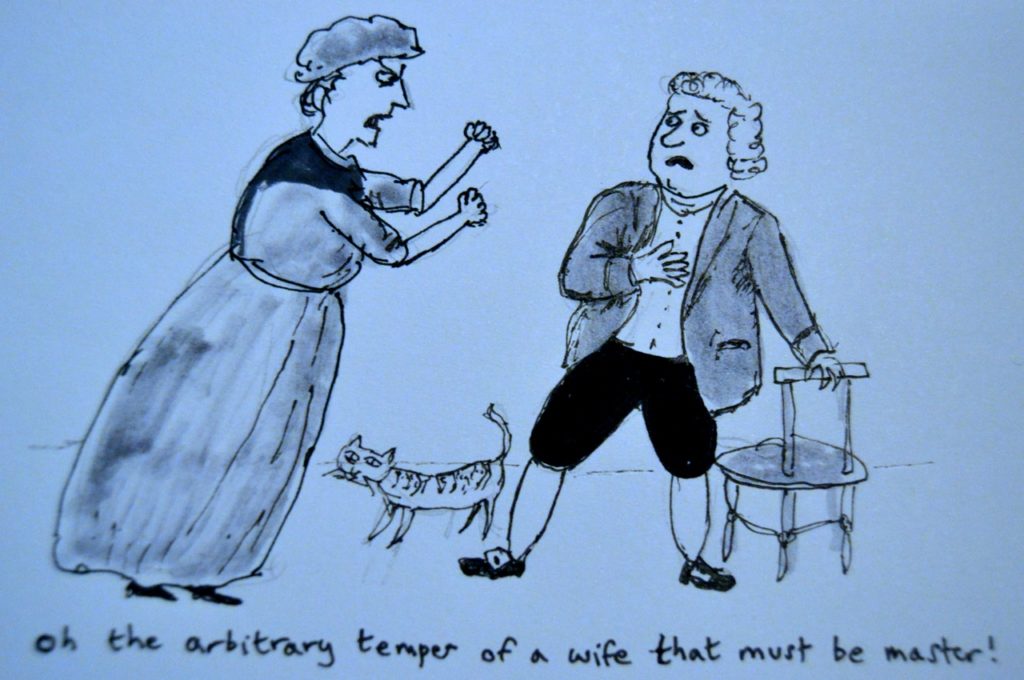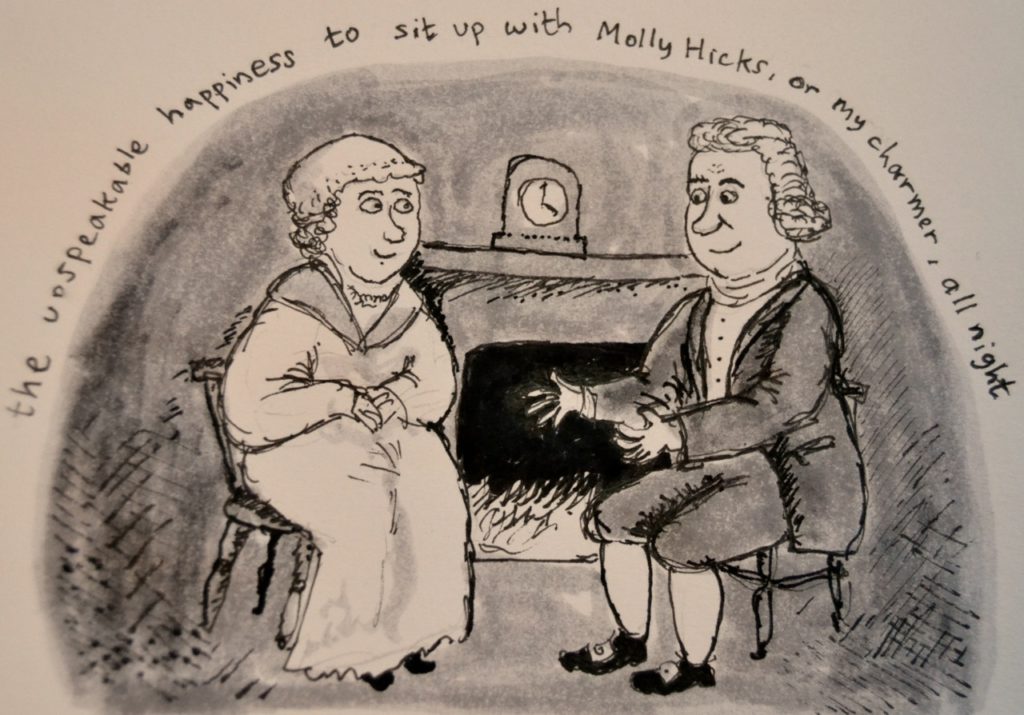Here follows the final instalment of Mathew Clayton’s monthly column exploring the daily life of a Sussex village in the middle of the 18th century, as recorded in the diary of Thomas Turner. With original illustrations by the author and artist Peter Chrisp.

And so it has come time to bid farewell to Thomas Turner and his bucolic life in East Hoathly. He started his diary in 1754 when he was 24 years old, quite new to the village, and it ends eleven years later in 1765 when he is 35 and far more established. We picked out the dramatic episodes — most of Thomas’s days are more mundane, e. g. ‘A melancholy headache today, gave some boys who came a singin 3d’ or ‘Paid James Marchant 2s for making 8 pairs of fearnought spatterdashes’. But even in these two short entries picked at random, there is something intriguing. There is always a thread to pull. What were the boys that came a-singin singing? What on earth are feathernought spatterdashes? The diary describes the familiar – nights in the pub, complaints about the weather, worries about money alongside a pre-industrial way of life. Long journeys are made by horse, the food is cooked on a fire, and most people worked in agriculture. Even if, like Turner, you took an interest in the wider world, your life took place mainly within a few miles from your home. The other major difference is health — particularly infant mortality. Turner has 8 children, one died after a month, another after five months, a third aged three years. Only one child lived beyond forty. Turner himself fared better – he was born in 1729 and died in 1793. He was married twice, firstly to Peggy Slater when he was 23. At times they seemed happy – she was always part of his late night capers around the village. Yet he does also complain repeatedly about their relationship. Here he is writing about her. Note the over-wrought style he always adopts when vexed…
Saturday 7 October 1758
Oh the arbitrary temper of a wife that must be master!…How happy must that man be whose more than happy lot it is to whom an agreeable company for life falls…He can open the inmost recesses of his soul to her and receive mutual and pleasing comfort to soothe the anxious and tumultuous thoughts that must many a time arise in the breast of a man in trade…and on the contrary (for I speak by woeful experience) how miserable they must be where there is nothing else but matrimonial discord and domestic disquietude!…How does this thought wreck my tumultuous breast!
Sadly though she suffered repeatedly from ill health.

Tuesday 23 June 1761
About 1.50 it pleased Almighty God to take from me my beloved wife, who, poor creature, has laboured under a severe and lingering illness these 38 weeks past, which she bore with the greatest resignation to the Divine will. In her I have lost a sincere friend and virtuous wife…
Thursday 25 June 1761
Oh how melancholy my situation. Not a friend to pour that pleasing balm of consolation into a heart overwhelmed with grief, no, nor one enlivening object gains admittance in my distracted breast, There, oh, there is naught by melancholy and pensive sadness! What can give pleasure or present one pleasing idea to the mind since she for whom I have lived is now no more?
Saturday 27 June 1761
Yesterday at about 5.50 I buried my wife at Framfield and with her all my hopes of worldly happiness.
And yet there was hope just over the horizon. Three and a half years later…
Sunday 9 December 1764
After dinner Sam Jenner and I walked to Lewes, I in order to see a girl which I have long since had thoughts of paying my addresses to…
That girl was Molly Hicks. By March he was referring to her as his ‘favourite girl’ and was spending more and more time in her company.
Thursday 28 March 1765
In the afternoon rode over to Chiddingly to pay my charmer, or intended wife or sweetheart of whatever other name may be proper, a visit…It being an excessive and windy night I had the opportunity – sure I should say the pleasure, or some might say the unspeakable happiness – to sit up with Molly Hicks, or my charmer, all night. I came home about 5.40 in the morn. I must not say fatigued – No! No! that could not be.
Turner’s love of late night seems to have been shared by his charmer; over the next few weeks he spends more early mornings in her company and by the middle of April he is referring to her as his intended wife.

Sunday 14 April 1765
As to her person I know it’s plain (so is my own), but she is cleanly in her person and dress (which I will say is something more than at first sight it may appear to be towards happiness). She is, I think a well-made woman… she has good sense and a seeming desire to improve her mind, and, I must in justice say, has always behaved to me with the strictest honour and good manners…Now for my real intentions: (it) is that of marriage and of the strictest honour, having nothing else in view but to live in a more sober and regular manner.
They were married 31 July 1765. They lived together for the rest of their days and had seven children. Molly died when she was 72 years old. But the diary stops when they got married. There is just one entry that appears a month after this date.
When I started this project I met Peter for a coffee to ask him if he would be interested in contributing the illustrations. Peter is better known as a children’s history author. He has written over 80 books but I had seen the wonderful drawings he had done with his partner Lisa Wolfe for a show they did together about the North West Passage. We met in what was once an eccentric coffee shop called Red Roaster on St James St in Brighton. Since I had last visited it had changed hands. It was now an equally peculiar café that was decorated in a gaudy baroque style best described as ‘dictator chic’. As we sat there feeling slightly out of place, Peter said: ‘I used to keep a diary, but then I stopped’.
‘Why did you stop?’ I asked?
‘I met Lisa. I became happy. I think that’s what happened to Thomas. He met Molly. He had someone to talk to. He was happy’.
p.s. One final thing. Feathernought spatterdashes – what are they? Spatterdashes are spats, feathernought is a type of stiff cotton. They were worn over the front of shoes to protect them from the mud.